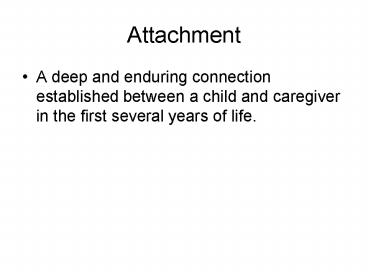Attachment - PowerPoint PPT Presentation
1 / 18
Title:
Attachment
Description:
Attachment. A deep and enduring connection established ... Boy-girl friendships and dates. Dating: Dunphy's phases. Initiation; Status; Affection; Bonding ... – PowerPoint PPT presentation
Number of Views:49
Avg rating:3.0/5.0
Title: Attachment
1
Attachment
- A deep and enduring connection established
between a child and caregiver in the first
several years of life.
2
Attachment
- Basic trust and reciprocity
- Exploration
- Self-regulation
- Identity
- Prosocial moral framework
- Core belief system
- Defense against stress/trauma
3
Attachment
- Established in the context of a relationship that
includes - touch
- eye contact
- smile and positive affect
- need fulfillment
4
Secure Attachment
- Self-esteem
- Independence/autonomy
- Resilience
- Impulse control
- Long-term friendships
- Relationships with authority figures (including
parents) - Prosocial coping skills
- Trust, intimacy and affection
- Positive belief systems
- Empathy, compassion, and conscience
- Behavioral performance and academic success
- Promote secure attachment with own children
5
Disrupted Attachment
- Low self-esteem
- Needy, clingy or pseudo-independent
- Decompensate under stress
- Lack self-control
- Unable to develop/maintain friendships
- Alienated from/oppositional with parents other
authority figures - Antisocial attitudes/behaviors
- Aggression/violence
- Incapable of genuine trust, intimacy, affection
- Negative, hopeless, pessimistic view
- Lack empathy, compassion, remorse
- Behavior/academic problems
- Perpetuate cycle
6
History of Attachment Theory
- John Bowlby
- Affectionless/homeless children
- Ethology
- Bowlby conclusions
- instinctual behaviors keep mother close
- smile is a social releaser
- certain conditions increase attachment
- maternal deprivation/separation traumatic
- loss causes pathological mourning
7
Attachment History
- Harry Bakwin
- James Robertson- stages of emotional reaction to
loss/separation - Harry Harlow
8
History of Attachment
- Mary Ainsworth
- Uganda Study
- Secure Base
- Phases of Attachment
- undiscriminating
- differential responsiveness
- separation anxiety
- active initiation
- stranger anxiety
9
Mary Ainsworth
- Strange Situation
- Attachment Patterns
- Secure
- Insecure
- Ambivalent
- Avoidant
- Disorganized
10
Adolescents
- Parents still important
- Boy-girl friendships and dates
- Dating Dunphys phases
- Initiation Status Affection Bonding
- Friendships More intimacy
- Friends similar psychologically
- Cliques and crowds
- Increased conformity
11
The Adult
- Social networks shrink
- Closer to family
- Romantic attachments
- Adult friendships valued
- Important to have one confidant
12
(No Transcript)
13
Emotions in Infancy
- Timing of emotions biologically programmed
- Tied to cognitive maturation
- Evolved to ensure that caregivers respond
- Social referencing by 10-12 months
- monitor reactions in others to help define
situation, regulate behavior and emotions - Modeling, imitation, reinforcement
14
Figure 14.1
15
Childhood Peers
- Important for social development
- Piaget equal power among peers
- Requires cooperation, negotiation skills
- Sullivan Peers important after age 6
- Changing interpersonal needs
- Harris Parental influence is overrated
- Peers more important for development
16
Peer Relations
- 18 mo first peers
- Turn taking
- Reciprocal play
- Age 2-12 increasing time spent
- Same sex peers
- Similar age and play preferences
17
Peer Acceptance
- Sociometric techniques
- Most popular kids
- Attractive, intelligent
- Socially competent
- Rejected kids
- Highly aggressive
- Socially isolated, overly sensitive, submissive
18
Play
- Age 1-2 Pretend play
- Age 2-5 Social play
- Age 5-6 Rule-based games
- By age 11-2 Rule flexibility
- Play is beneficial
- Cognitive development
- Social skills































